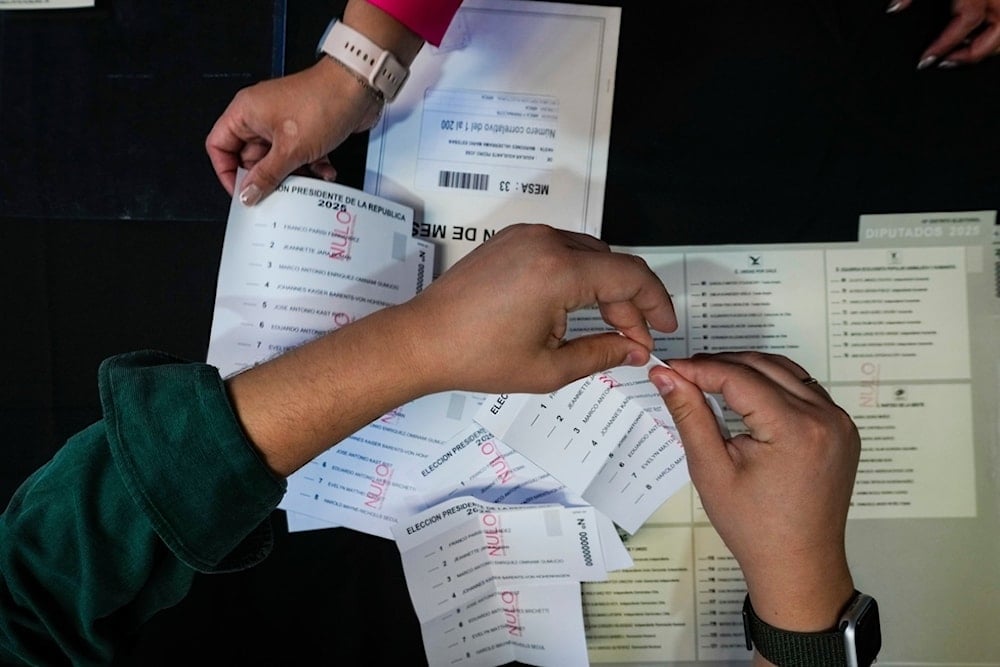Communist vs. far right: Chileans vote for president, parliament
Chileans head to the polls in a high-stakes 2025 election, with right-wing candidates gaining ground as crime and immigration reshape the political landscape.
-

An electoral worker prepares demonstration ballots inside the old Mapocho train station that is now a cultural center to be used as a polling station for the general election in Santiago, Chile, Friday, November 14, 2025 (AP)
Chileans headed to the polls on Sunday in a pivotal presidential and legislative vote, with public concerns over crime and immigration setting the tone for a potential political shift. The 2025 general election pits the governing leftist coalition against a field of right-wing candidates vying for control amid shifting voter sentiment.
Polling stations opened at 8 am local time (1100 GMT) and are scheduled to close at 6 pm (2100 GMT), though lines may extend that window. Initial results are expected shortly after polls close, with a full count anticipated within hours.
It’s the first of what’s likely to be two rounds of presidential elections in the South American country.
Eight presidential candidates are competing in the race, though none are expected to secure the 50% plus one vote required for an outright victory. A run-off between the top two contenders is likely on December 14.
The electoral campaign has been dominated by debates over crime and immigration, issues that have overtaken the optimism surrounding constitutional reform seen in the last presidential cycle.
Jeannette Jara, representing the ruling coalition and the Communist Party, leads the race according to the latest available polls. Far-right contender Jose Antonio Kast of the Republican Party trails closely behind. A previous frontrunner, moderate-right politician Evelyn Matthei, has seen support dip in recent months, trading third place with libertarian candidate Johannes Kaiser.
Read more: Maduro decries CIA campaigns justifying aggressions in region
Right-wing challengers aim to unseat leftist coalition
The growing popularity of right-wing candidates in Chile signals a marked shift from the momentum that carried current Chilean President Gabriel Boric to power. Boric, who is not eligible for reelection, rose amid public calls for progressive reforms and a new constitution.
Now, fears over public safety and social stability have reoriented the national debate. Analysts note that this shift could mark a return to right-wing leadership for the first time since the end of Augusto Pinochet’s military regime in 1990.
New voters and mandatory voting reshape political landscape
For the first time in years, voting is mandatory for Chile’s 15.7 million registered voters. In the previous election, the abstention rate reached 53% in the first round. The participation of a broader voting base adds a layer of unpredictability to the outcome.
“It’s an unprecedented scenario we haven’t lived through, and it’s playing out in a presidential election,” Guillermo Holzmann, a political analyst at the University of Valparaiso, told Reuters. He emphasized that new voters may prioritize direct solutions over ideological alignment.
“(New voters) don’t think in terms of left, right or center, they think in terms of what changes are needed and what will benefit them,” he added.
Read more: Chilean President describes Israeli PM Netanyahu as 'war criminal'
Control of Congress at stake in pivotal legislative elections
In addition to the presidency, voters are electing a new legislature. All 155 seats in the lower house and 23 of the 50 Senate seats are up for grabs. Currently, the governing coalition holds a minority in both chambers.
If right-wing parties secure majorities in Congress and the presidency, it would signal a dramatic political realignment, consolidating conservative power across Chile’s key institutions.

 3 Min Read
3 Min Read










